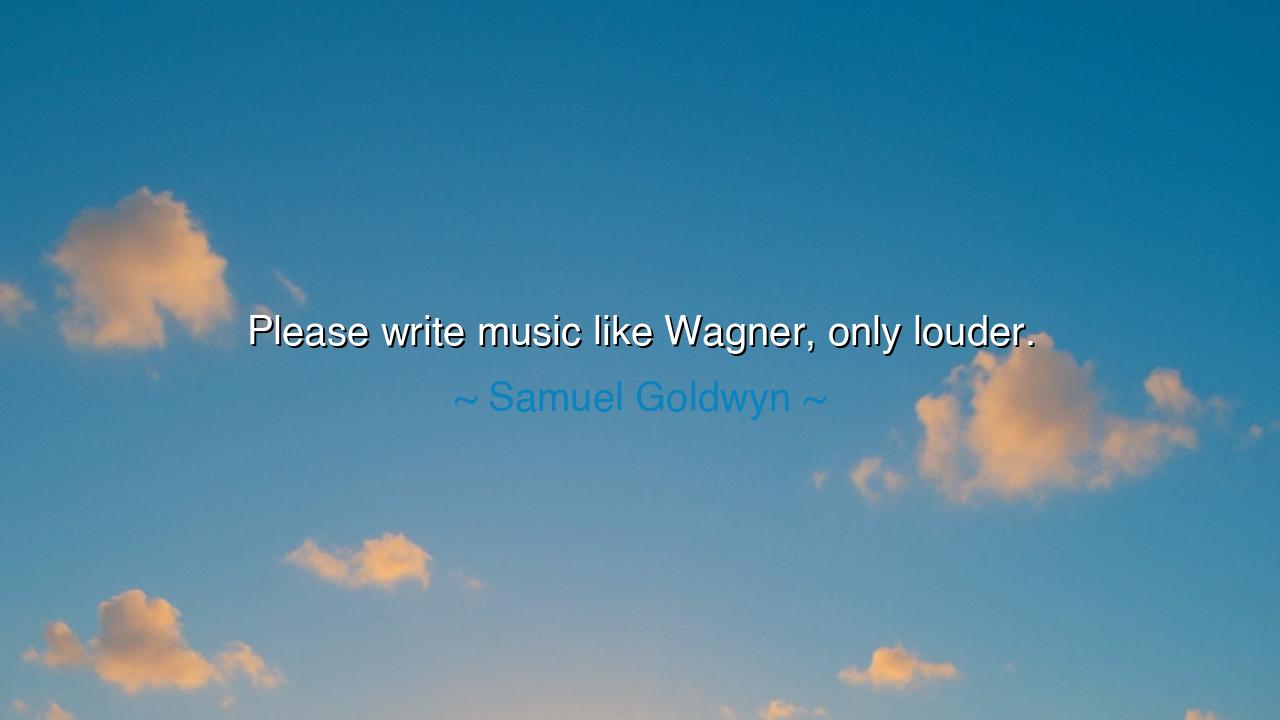
Please write music like Wagner, only louder.






Hear the immortal humor of Samuel Goldwyn, a titan of Hollywood and a master of paradox, who once commanded: “Please write music like Wagner, only louder.” Though uttered as jest, these words are more than a whimsical plea; they reveal the eternal tension between art and spectacle, between subtlety and force, between the quiet majesty of genius and the thunderous demands of an age hungry for sensation. Goldwyn, known for his bold sayings, captured in this single phrase the hunger of mankind for grandeur, and the danger of mistaking volume for greatness.
The first wisdom in this saying lies in the invocation of Wagner. Richard Wagner, the German composer, was no mere musician—he was a builder of worlds. His operas did not whisper but roared, weaving myth, philosophy, and music into storms that shook the very soul. To call for “music like Wagner” is to call for the colossal, the overwhelming, the music that drowns ordinary life in waves of passion and awe. Wagner himself sought the “total work of art,” uniting music, poetry, and stagecraft into one transcendent vision.
But then comes the paradox—“only louder.” Goldwyn, with his wit, unmasks the misunderstanding of art so often found in the marketplace of entertainment. True greatness is not in sheer volume, nor in spectacle alone. To make music louder is not to make it better. Yet the saying reflects a truth: in an age where attention is fleeting and audiences restless, the temptation is always to increase the noise, to overwhelm rather than to elevate. Thus, Goldwyn’s command is both a jest and a warning, showing how easily men confuse intensity with depth.
History offers us mirrors of this truth. Consider the gladiatorial games of Rome. What began as solemn rituals to honor the dead became, in time, grand spectacles designed to awe the masses. Louder cries, greater blood, more overwhelming sights—yet as the volume grew, the depth diminished. Rome mistook noise for greatness, and in that mistake lay the seeds of decline. The lesson is clear: louder is not always greater; true power lies in harmony, in meaning, in depth.
Yet there is also a hidden praise within Goldwyn’s jest. To invoke Wagner is to admit that music—and indeed all art—must strive to move beyond the ordinary. Wagner’s music was not polite background; it demanded attention, it struck the heart with awe. Goldwyn’s call for “louder” reflects the eternal desire of humankind for art that does not fade into silence but thunders into memory. He wished for music that could pierce through distraction and seize the soul, reminding us that the purpose of art is not to flatter the ear but to stir the spirit.
The lesson, then, is twofold: seek grandeur, but do not confuse noise with greatness. True success in art—or in life—is not found in the sheer force of volume, but in the balance of strength and depth, of power and meaning. Wagner himself was not merely loud; he was profound. His music endures not because it shook the rafters, but because it shook the soul. Let us not forget this distinction, for to mistake noise for greatness is to chase shadows while missing the light.
Practical wisdom follows: in your own work and life, do not strive only to be “louder.” Do not confuse attention with achievement, or spectacle with significance. Instead, strive to be like Wagner in depth, in vision, in the courage to create something that endures. Let your work be bold, yes, but let it also be meaningful. Seek not merely to be heard, but to be remembered.
Thus, remember Goldwyn’s humorous but revealing words: “Please write music like Wagner, only louder.” Let them remind you of the eternal pull between substance and spectacle, and of the need to choose depth over noise. For in the end, it is not the loudest voice that endures through the ages, but the truest one.






AAdministratorAdministrator
Welcome, honored guests. Please leave a comment, we will respond soon